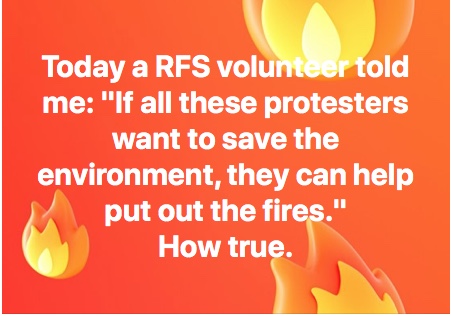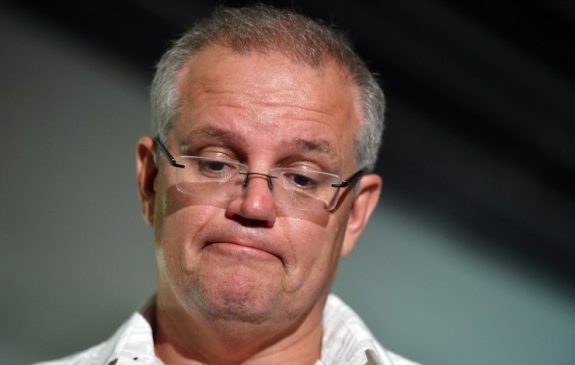They have nothing to do with providing the public with information about the Government’s progress in resolving issues, or initiatives in progress, or even the introduction of new ideas.
Lying in government, except for reasons of national security, is wrong at any time, however when they do it with deliberate intention of omission it is even more so. Scott Morrison’s Government, however, seem to do it with impunity.
The document contained an extensive range of talking points over a wide area of policy that including spin about drought assistance, climate change, rising carbon emissions, the banking inquiry, and other matters of embarrassment to the government.
On radio and morning television programs newsreaders and hosts treated the matter as being funny and a bit of a joke.
It isn’t.
If you are asked about the ACCC inquiry announced by the Treasurer …
The government has directed the ACCC to undertake an inquiry into the pricing of residential mortgage products, particularly after the banks failed to pass on the RBA’s recent interest rate cuts in full.
The Inquiry will focus on the period from 1 January 2019. Since this date, there have been three cuts (June, July and October) by the RBA to the official cash rate.
Together these cuts have reduced the cash rate by 75 basis points, and the big four banks have passed on an average 57 basis points in owner-occupied home loan rates.
The major banks have decided to put their profits before their customers, and that’s not a good outcome for their customers or the economy.
As the Reserve Bank governor pointed out recently “lower interest rates put more money into the hands of the household sector and, at some point, this extra money gets spent and this helps the overall economy.
The inquiry will ensure the pricing practices of the banks are better understood and made more transparent by; understanding how banks make pricing decisions for residential mortgages – which is particularly important in the current context of banks not passing on the RBA rate cuts in full. Assessing how prices differ for new and existing customers. Investigating barriers to switching.
The inquiry will consider pricing across the entire residential mortgage market by major banks, smaller banks, and non-bank lenders. But the big four banks will be a key focus of this inquiry, given they hold around 75% of residential mortgage debt.
The government is committed to increasing competition in banking and promoting good consumer outcomes in the mortgage market to ensure that consumers can get a better deal.
The consumer data right provides consumers with greater access to their personal information giving them power to securely transfer their banking data to other providers to get a better deal. This is one of a number of policies the government is implementing to increase competition.
If asked how this differs to the royal commission and previous ACCC inquiries …
The financial services royal commission specifically focused on misconduct rather than the way that banks are pricing their mortgages.
The ACCC’s previous residential mortgage price inquiry specifically focused on whether the major bank levy affected the prices charged for residential mortgages.
The government has also decided to acknowledge the IMF climate report, which said Australia would fail to meet its Paris target:
We’re taking meaningful action to reduce global emissions with our $3.5bn climate solutions package that will deliver the 328 million tonnes of abatement needed to meet our 2030 Paris target.
Our national target is achievable, balanced and responsible, and is part of coordinated global action to deliver a healthy environment for future generations while keeping our economy strong.
In the electricity sector, we are reducing emissions while maintaining reliable and secure supply:
The latest official projections show the national electricity market (NEM) is on track to be 26% below 2005 levels by 2022, eight years early.
On the back of $25bn of committed investment in clean energy, Australia leads the world with more than double the per capita investment of countries like France, Germany and the UK.
If asked – IMF climate change report saying we will not meet our 2030 target …
We’ll meet our target without introducing a carbon tax.
When Labor were in government and introduced a carbon tax, energy prices went up and industry threatened to take jobs offshore.
The IMF report does not take into account our $3.5bn package which maps out to the last tonne how we will deliver the 328mt of abatement needed to reduce emissions to 26 to 28% below 2005 levels by 2030.
The report also states that under a $75 carbon tax, retail electricity prices would increase by 70-90% in Australia.
That is not something we are going to do to Australian households and small businesses.
The Guardian
adds that
: “When asked about that on Friday, Josh Frydenberg seemed to miss the question and answered along the lines of “Who said that? Labor?” which is a standard response these days.”
“The government is also pretty into what the party who is not in government is doing. Joel Fitzgibbon has given them some extra steam… “
Labor division on energy policy …
Joel Fitzgibbon has backflipped on his recent calls for a carbon tax and again presented yet another position on energy policy – this one driven by self-interest to save his own seat, following huge swings against him at the recent election.
Meanwhile Bill Shorten and Penny Wong have recently said they are “proud” of Labor’s reckless 45% target and made the case to keep it.
This follows calls by the assistant climate change spokesman Pat Conroy to scrap their 45% emissions reduction target but Labor change spokesman Mark Butler won’t commit to anything.
Whether it’s “Chairman Swanny” calling for Labor to keep their $387bn tax and spend agenda or Fitzgibbon looking back to the future then doing a backflip, Labor haven’t learned the lessons from the election and want to rehash policies Australia has comprehensively rejected.
We’re taking meaningful action to reduce global emissions with our $3.5bn climate solutions package that will deliver the 328 million tonnes of abatement needed to meet our 2030 Paris target.
Under our government Australia leads the world with more than double the per capita investment of countries like the UK, France and Germany.
The Guardian also adds:
“But the best thing about this one is that the government actually admits that emissions have increased (at least through its notes). For the records, emissions have increased every year since 2014, when the carbon price was scrapped.”
If asked about recent increases in emissions …
Emissions fell 0.4% over the first quarter of 2019.
Emissions for the year to March 2019 are up 0.6 % or 3.1 Mt. This small increase is due to an 18.8% increase in LNG exports. LNG production related emissions increased 4.7 Mt.
Absent the increase in LNG exports, total emissions would have declined. Australia’s LNG exports for the year to March 2019 are estimated to be worth $47.8bn.
While this industry’s success has increased Australia’s emissions, it has potentially reduced global emissions by up to 28% of Australia’s annual emissions by displacing coal generation in importing countries.
We are nearly half way towards our 2030 Paris target – emissions are down 11.7% on 2005 levels and the emissions intensity of the economy and per capita are at their lowest levels in nearly three decades.
We are also on track to overachieve on our 2020 target by 367 million tonnes.
And these are just some examples from 17 pages of nonsense. A government that finds it necessary to have to mislead the public so openly isn’t worth a pinch of salt, let alone a pot of Fosters.
Like what we do at The AIMN?
You’ll like it even more knowing that your donation will help us to keep up the good fight.
Chuck in a few bucks and see just how far it goes!













